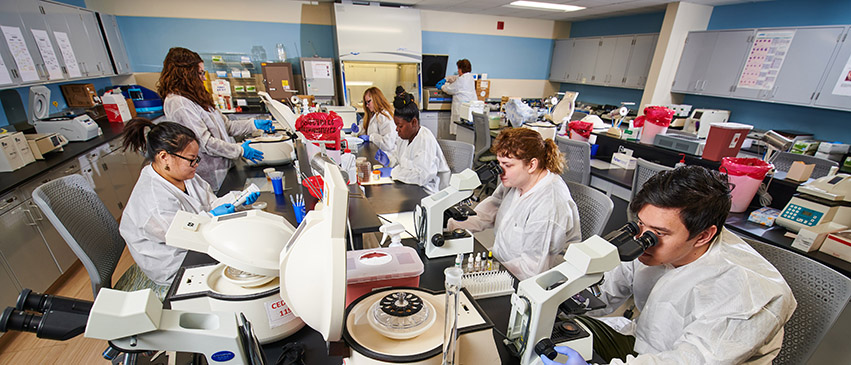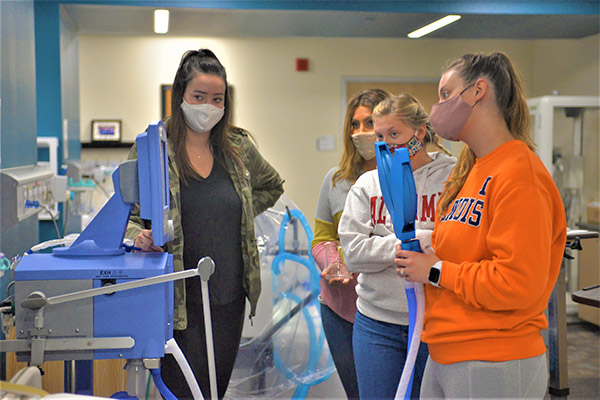
Illinois Central College has played a major role in the regional battle against the pandemic by training over 600 future healthcare professionals today in order to help the patients of tomorrow. With a bright spotlight on healthcare and medical workers, we have been living out our mission of changing lives while also saving future lives.
Healthcare continues to be Greater Peoria’s largest employer, with over 30,000 people and 19 percent of the regional workforce employed in health careers—and ICC is leading the way in training these highly skilled workers. According to labor market analytics firm EMSI, the college produces three times more health program graduates than any other educational institution in the area.
Before the pandemic, health careers were expected to grow 15 percent from 2019 to 2029, according to the U.S. Bureau of Labor Statistics (BLS), adding 2.4 million new jobs, a much faster rate than all other occupations. When COVID-19 hit, employment growth in healthcare initially slowed due to the reduction in elective procedures and other measures taken to fight the illness. However, industry employment has recently started growing again as organizations reopen to patients.
Registered Respiratory Therapists
The much-deserved spotlight on healthcare workers has brought specialties into the limelight that are especially critical to COVID-19 patients. Students in the Respiratory Therapist program at ICC, for example, are trained in the prevention, treatment, management and rehabilitation of lung problems.

Registered Respiratory Therapists (RRTs) measure the capacity and performance of patients’ lungs by conducting pulmonary function studies, along with giving aerosol medicines, maintaining artificial airways, and establishing mechanical breathing using ventilators. In the Peoria region, new respiratory therapists start around $41,989. Average annual pay is $54,281, while highly experienced RRTs earn up to $64,845 annually. Each year, there are approximately 27 job openings in our area.
“Many COVID-19 patients have difficulty breathing, so respiratory therapists play a vital role in caring for these patients’ respiratory needs, especially within the ICUs,” explains Wendee Guth, ICC Dean of Health Careers. While there’s not a shortage yet, the BLS expects the need to increase by 23 percent over the next six years. “I would expect the pandemic to accelerate that need and create a lot of interest in the career field.”
Medical Laboratory Technicians
Another specialty career in high demand due to COVID-19 is Medical Laboratory Technicians (MLTs). The Medical Laboratory Technician program at ICC teaches students how to perform most of the common tests done in a medical laboratory. MLTs test and examine samples, analyze the results, and relay them to physicians to help determine the right treatments for patients. But with a lack of qualified lab technicians and the inundation of COVID-19 tests, some parts of the nation are experiencing long delays in receiving test results.
To help combat this shortage, ICC was recently awarded a $100,000 grant by the Illinois Community College Board to implement the Gateway to Medical Laboratory Technician Careers Program. This eight-week bridge program will qualify 25 unemployed, underemployed or underrepresented adults for entry into ICC’s Medical Laboratory Technician associate degree program, which partners with local employers and community-based organizations and provides participating students with a stipend.
“The global pandemic and growing aging population have brought about an unprecedented demand for MLTs. Workforce shortages and skills gaps have been reported by both private and public employers,” says ICC Vice President of Workforce and Diversity Dr. Rita Ali. “ICC is committed to answering the call from regional employers to help area residents earn a workforce credential in order to fill these local workforce gaps.”
Overall employment of clinical laboratory technicians is projected to grow seven percent from 2019 to 2029, according to the BLS. In the Peoria region, new MLTs start at a salary around $28,070; the median salary is $50,663; while highly experienced MLTs earn up to $73,828 per year. There are approximately 66 annual job openings in the Greater Peoria area.
A Hybrid Approach
Training for these specialties and other health career programs at ICC is currently completed through hybrid courses, a mix of online lectures and in-person instruction. At the ICC Peoria campus, health career students experience real-world, hands-on learning in state-of-the-art medical facilities and simulation labs, which replicate a hospital-like setting and allow students to train on the same medical equipment used in local hospitals and clinics. Social distancing, specific entry and exit points, and personal protective equipment are enforced in these areas.
ICC also offers health career programs leading to a certificate or degree in emergency medical services, dental hygiene, medical coding, nursing, radiography, surgical technology and more. View the complete list of ICC health career programs at icc.edu/health-careers. PM
- Log in to post comments

